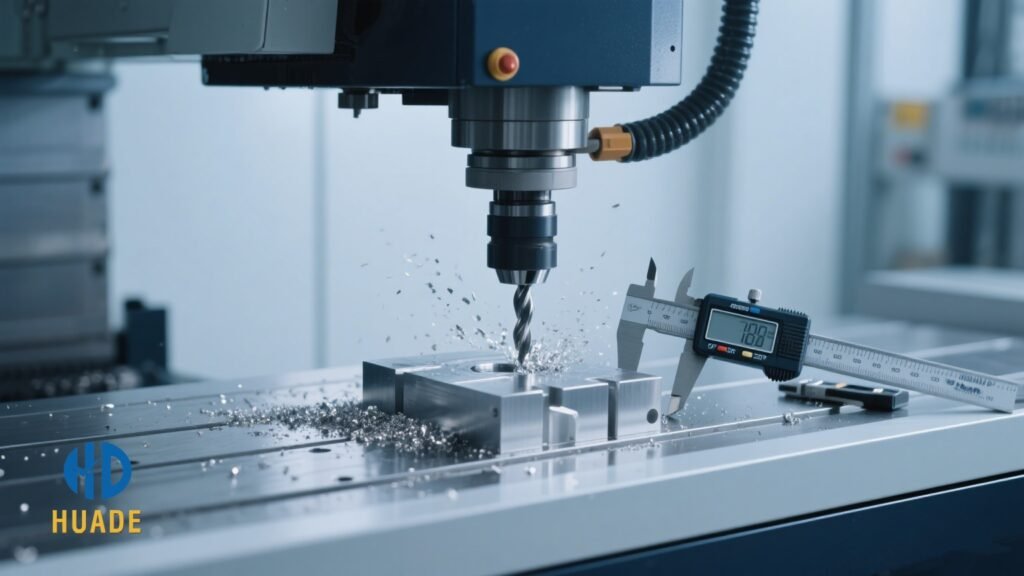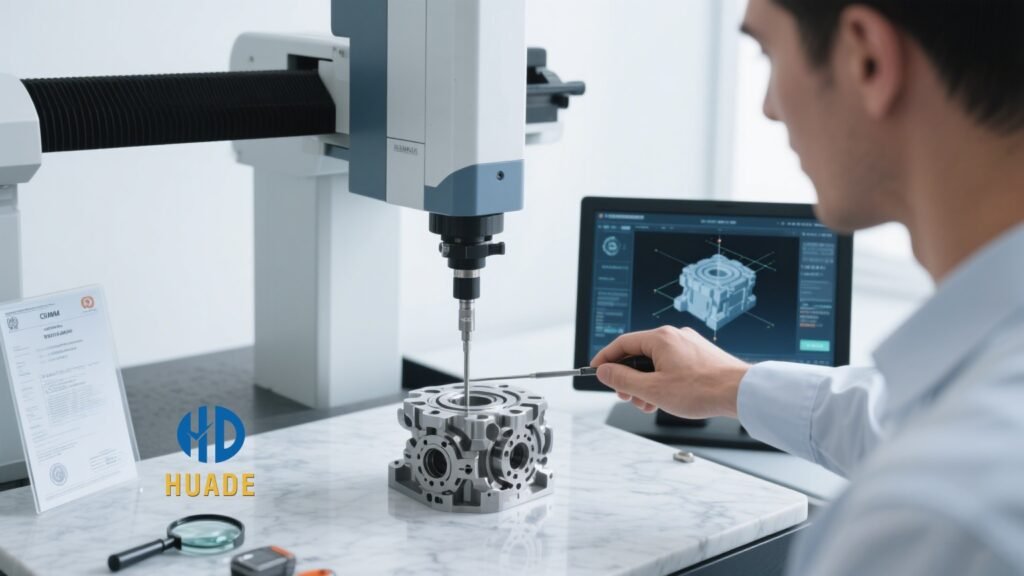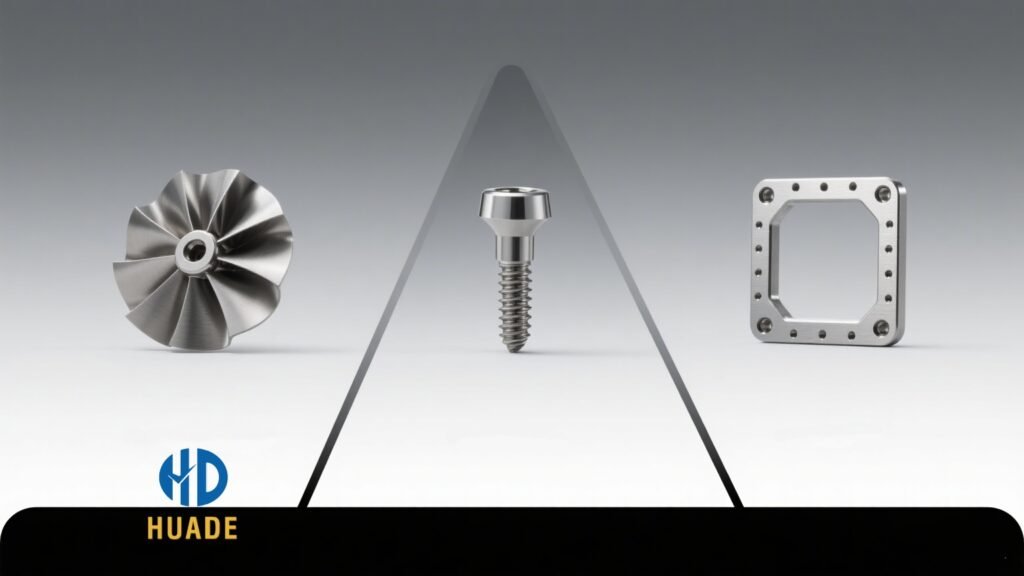Precision isn’t just a requirement—it’s the difference between a product that performs flawlessly and one that fails. Precision CNC machining has redefined what’s possible, enabling the production of components with micron-level accuracy that power everything from life-saving medical devices to cutting-edge aerospace systems. For industries where even the smallest deviation can have critical consequences, mastering this level of precision is non-negotiable. At Dongguan Huade Precision Manufacturing Co., Ltd., we’ve refined our precision CNC machining services processes to deliver consistent, reliable accuracy that meets the most demanding standards.
The Foundations of Precision CNC Machining
Achieving micron-level accuracy (where 1 micron equals 0.001 millimeters) requires more than just advanced equipment—it demands a holistic approach that combines technology, expertise, and meticulous attention to detail. At its core, precision CNC machining relies on three critical pillars:
High-Performance Equipment is the first building block. Our facility houses state-of-the-art CNC machines with rigid frames and thermal stability features that minimize vibration and heat-induced expansion—two common enemies of precision. These machines are calibrated to maintain positional accuracy within ±2 microns, even during extended production runs. Advanced servo motors and ball screws ensure smooth, precise movement of cutting tools, while real-time feedback systems constantly adjust for any Micron-level variation.

Close-up of a precision CNC machine in operation, showing cutting tool working on a metal workpiece with visible measuring tools nearby.
Tooling and Material Expertise plays an equally vital role. The choice of cutting tools directly impacts precision: we use ultra-hard carbide and ceramic tools with sharp, precisely ground edges that reduce material deformation. Different materials—from stainless steel and titanium to high-performance plastics—require tailored approaches. For example, machining heat-resistant alloys demands slower feed rates and specialized coolants to prevent tool wear and maintain dimensional stability, while softer metals require careful chip control to avoid surface damage.
Advanced Programming transforms design specifications into precise machine movements. Our programmers use CAM software with high-precision algorithms that generate toolpaths optimized for accuracy. By simulating the machining process digitally, we identify potential collisions or tool deflection issues before production begins, eliminating costly errors and ensuring consistent results across every part.
Mastering Tolerance Control: Beyond the Numbers
Tolerance control is the heartbeat of precision CNC machining. While standard machining might aim for tolerances of ±0.01mm, precision applications often require ±0.002mm or tighter—challenges that demand rigorous process control.
Environmental factors play a surprising role in maintaining these tight tolerances. Temperature fluctuations as small as 2°C can cause metal workpieces to expand or contract beyond acceptable limits. That’s why our production facility features climate-controlled environments with stable temperatures (20±1°C) and humidity levels, ensuring consistent material behavior throughout machining.
Workholding is another critical factor. We use precision fixtures and clamping systems that secure workpieces without introducing distortion. Vacuum chucks and magnetic fixtures provide uniform pressure for thin or delicate parts, while custom jigs ensure repeatable positioning—critical for multi-operation machining where each step must align perfectly with the last.
Even the smallest details matter. For example, tool wear is monitored continuously using in-machine sensors that detect changes in cutting forces, prompting automatic tool changes before accuracy degrades. Coolant delivery systems are precisely positioned to reduce thermal stress on both tools and workpieces, further preserving dimensional integrity.
Measurement Technology: Verifying Micron-Level Accuracy
Precision machining means nothing without accurate measurement. To verify micron-level accuracy, we’ve invested in a suite of advanced inspection tools that leave no room for error:
Coordinate Measuring Machines (CMMs) are the backbone of our quality control. These automated systems use touch probes or laser scanners to map part dimensions in 3D, comparing results to CAD models with accuracy up to 0.5 microns. For complex geometries, we use optical CMMs that capture millions of data points, ensuring every surface and feature meets specifications.

Operator using a coordinate measuring machine (CMM) to inspect a precision-machined part.
Optical comparators and toolmakers’ microscopes provide detailed visual inspection of small features like threads, grooves, and holes, magnifying details up to 100x for precise measurement. For surface finish requirements—critical in applications like hydraulic components—we use profilometers that analyze surface roughness at the micron level, ensuring proper functionality and longevity.
All measurement data is logged and stored in our quality management system, creating a complete traceability record for every part. This documentation isn’t just for compliance; it helps us identify trends, refine processes, and continuously improve our precision capabilities.
Quality Assurance: A Process, Not Just a Check
At Dongguan Huade, precision is built into every stage of production, not just inspected at the end. Our quality assurance process starts long before CNC machining services begin, with rigorous checks at every stage:
- Design for Manufacturability (DFM) Reviews: Our engineers collaborate with clients to optimize part designs for precision machining, suggesting modifications that enhance accuracy while maintaining functionality.
- In-Process Inspection: Critical dimensions are measured at key stages during machining, allowing immediate adjustments if deviations are detected.
- Final Validation: Every part undergoes a comprehensive inspection, with statistically significant sampling for high-volume runs to ensure consistent quality.
- Calibration Schedules: All machines and measuring tools are calibrated regularly by certified technicians, with documentation traceable to national standards.
Industries Demanding Precision CNC Machining
Precision CNC machining is the backbone of industries where accuracy directly impacts performance, safety, and reliability:
- Aerospace: Aircraft engine components, navigation systems, and structural parts require micron-level precision to withstand extreme temperatures and pressures while minimizing weight.
- Medical Devices: Surgical instruments, implantable devices, and diagnostic equipment demand precise tolerances to ensure biocompatibility and reliable performance in critical procedures.
- Semiconductor Manufacturing: Tooling and components for chip fabrication must meet ultra-tight tolerances to handle microscopic electronic features.
- Optics: Lenses, mirrors, and optical mounts require precise surface finishes and dimensional accuracy to ensure proper light transmission and alignment.

Collage of precision CNC machined parts from different industries (aerospace component, medical device part, semiconductor tooling).
Partner for Precision: Your Trusted Precision CNC Machining Provider
Achieving micron-level accuracy isn’t just about technology—it’s about experience, discipline, and a commitment to excellence. At Dongguan Huade Precision Manufacturing Co., Ltd., we bring decades of expertise in precision CNC machining to every project, whether you need a single prototype or high-volume production.
Ready to experience the difference precision makes? Visit our website at www.hdproto.com to learn more about our capabilities, or [send us an inquiry] directly through our contact page. You can also reach our team at sales@hdproto.com to discuss your specific precision requirements.
In a world where precision defines possibility, let us help you build the next generation of innovative products—one micron-perfect part at a time.

GOOD JOB